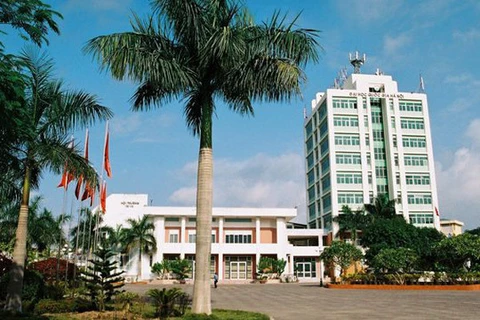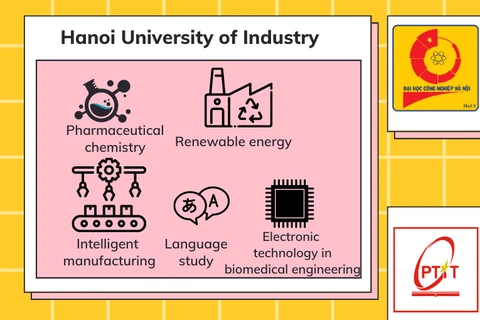 A lesson in the UWE Bristol - Phenikaa Campus programme for undergraduates at Phenikaa University. (Photo: VietnamPlus)
A lesson in the UWE Bristol - Phenikaa Campus programme for undergraduates at Phenikaa University. (Photo: VietnamPlus) Hanoi (VNA) – Training cooperation with foreign partners is currently a growing trend among universities in Vietnam. This year’s intake season, apart from admission information of their faculties, universities have also unveiled admission targets for many cooperative training programmes with foreign partners.
More choices for students
This year, Phenikaa University plans to admit 150 students for UWE Bristol - Phenikaa Campus, a training programme for undergraduates under the cooperation programme between this university and the UK’s University of the West of England Bristol (UWE Bristol). This programe comprises seven specialities, namely business administration, business and marketing, event management, accounting and finance, computer science - artificial intelligence, computer science - development of smart devices, and information technology.
The Vietnamese university said that in this programme, the original British-standard curricula of UWE Bristol is combined with Phenikaa’s unceasing efforts in training quality improvement to provide a high-quality learning environment for students and help them get used to the multinational culture. They will be equipped with sufficient knowledge and skills to become global citizens and meet requirements of the domestic and international labour markets.
Meanwhile, the National Economics University (NEU) has also announced its intake targets for seven cooperative training programmes with those of France, the UK, the Republic of Korea (RoK), Australia, and New Zealand.
They include graduate training courses organised in coordination with La Trobe University of Australia, Dongseo University of the RoK, Univesity of Waikato of New Zealand, and some British universities.
 Students have opportunities to follow international-standard courses right in Vietnam. (Illustrative photo: VietnamPlus)
Students have opportunities to follow international-standard courses right in Vietnam. (Illustrative photo: VietnamPlus) Comprising many member colleges and institutes, the Vietnam National University, Hanoi (VNU) currently has the biggest numbers of cooperative training programmes in the country, with 78 specialities from the graduate to doctoral levels held in coordination with many universities around the world.
Prof. Nguyen Dinh Duc of the VNU said most of the cooperative training programmes have degrees granted by foreign partners, so graduates will have internationally recognised degrees.
The courses could take place completely in Vietnam or in both Vietnam and at partner schools abroad. This form of training helps students save much money as they can stay in the country while still enrolling in foreign training programmes, improving foreign language skills, and experiencing a multicultural environment, he added.
As of December 2021, there were 408 training programmes under cooperation with foreign partners. They consist of 186 licensed by autonomous estalishments of tertiary education and 222 by the Ministry of Education and Training.
Choosing suitable courses
Despite many advantages, most of the cooperative training programmes require entry scores lower than those of the schools’ corresponding courses to attract students since they have relatively high tuition fees, up to hundreds of millions of VND per course.
 Pham Quang Vinh, who had the best graduation results of RMIT University Vietnam in 2023, speaks at the graduation ceremony. (Photo: VietnamPlus)
Pham Quang Vinh, who had the best graduation results of RMIT University Vietnam in 2023, speaks at the graduation ceremony. (Photo: VietnamPlus) Besides, many students and their parents are also concerned about the quality of the foreign partners in cooperative training programmes.
Nguyen Thu Thuy, Director of the Higher Education Department under the Ministry of Education and Training, said that in the over 400 cooperative training programmes, 62.71% of the foreign partner schools are not ranked or named among the 1,000 establishments in the QS Universitiies Rankings or THE World University Rankings 2021.
She added that there is a diversity of specialities and partners in cooperative training programmes. The UK is taking the lead in the number of such programmes in Vietnam, with 101 programmes or 25%. It is followed by the US (59), France (53), Australia (37), and the RoK (27). The joint programmes with the UK, the US, France, Australia, and the RoK account for about 70% of the total at present.
Economic and management specialities still make up the majority of the training programmes, 64%, followed by science and technology-related specialities 25%, social sciences and humanities 8%, and others (health care, medicine, law) 3%.
Leaders of universities suggested that when choosing cooperative training programmes to enroll in, students should select the specialities suitable for their abilities, strengths, and favourites, thoroughly learn about Vietnamese schools and foreign partners, and consider expenses as well as their families’ financial capacity./.

























